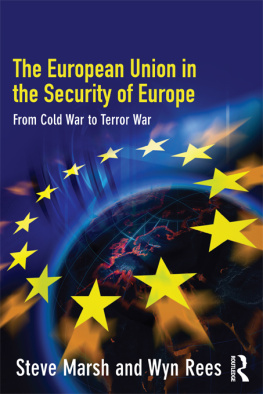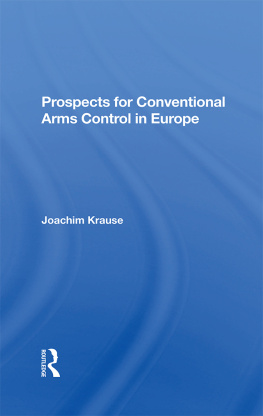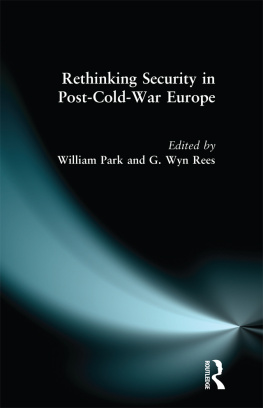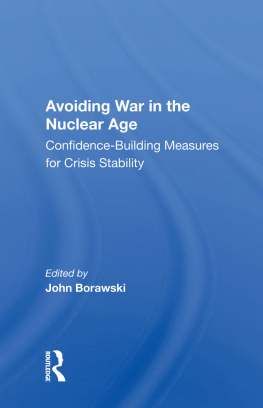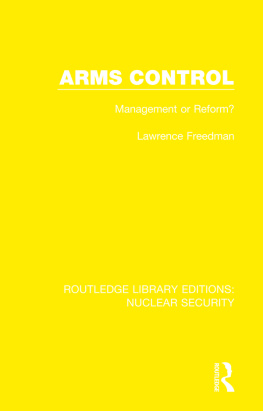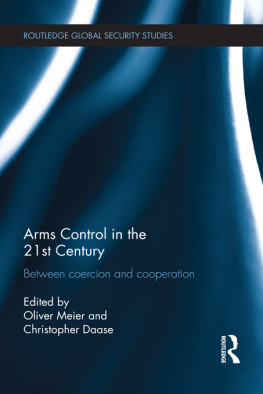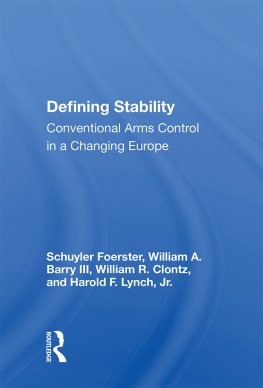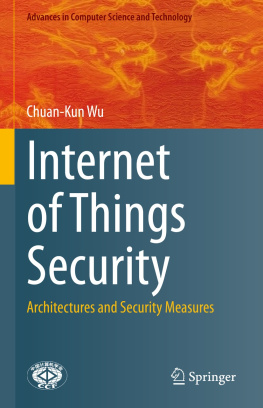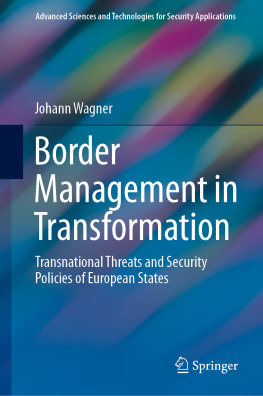Cover
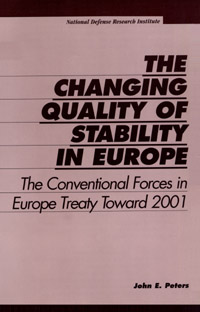
| title | : | The Changing Quality of Stability in Europe : The Conventional Forces in Europe Treaty Toward 2001 |
| author | : | Peters, John E. |
| publisher | : | RAND |
| isbn10 | asin | : | 0833027832 |
| print isbn13 | : | 9780833027832 |
| ebook isbn13 | : | 9780585384078 |
| language | : | English |
| subject | Treaty on Conventional Armed Forces in Europe--(1990) , Arms control--Europe, United States--Military relations--Europe, Europe--Military relations--United States. |
| publication date | : | 1999 |
| lcc | : | KZ5885.21992.P482 2000eb |
| ddc | : | 341.7/33/094 |
| subject | : | Treaty on Conventional Armed Forces in Europe--(1990) , Arms control--Europe, United States--Military relations--Europe, Europe--Military relations--United States. |
Page i
The research described in this report was sponsored by the Office of the Secretary of Defense (OSD). The research was conducted in RAND's National Defense Research Institute, a federally funded research and development center supported by the OSD, the Joint Staff, the unified commands, and the defense agencies, Contract DASW01-95-C-0059.
Library of Congress Cataloging-in-Publication Data
Peters, John E., 1947
The changing quality of stability in Europe : the Conventional
Forces in Europe Treaty toward 2001 / John E. Peters.
p. cm.
MR-1104-OSD.
Includes bibliographical references.
ISBN 0-8330-2783-2
1. Treaty on Conventional Armed Forces in Europe (1990).
2. Arms controlEurope. 3. United StatesMilitary
relationsEurope. 4. EuropeMilitary relationsUnited States.
I. RAND Corporation. II. Title.
| KZ5885.21992.P482 2000 |
| 341.7'33'094dc21 | 99-052261 |
RAND is a nonprofit institution that helps improve policy and decisionmaking through research and analysis. RAND is a registered trademark. RANDs publications do not necessarily reflect the opinions or policies of its research sponsors.
Copyright 2000 RAND
All rights reserved. No part of this book may be reproduced in any form by any electronic or mechanical means (including photocopying, recording, or information storage and retrieval) without permission in writing from RAND.
Published 2000 by RAND
1700 Main Street, P.O. Box 2138, Santa Monica, CA 90407-2138
1333 H St., N.W., Washington, D.C. 20005-4707
RAND URL: http://www.rand.org/
To order RAND documents or to obtain additional information,
contact Distribution Services: Telephone: (310) 451-7002;
Fax: (310) 451-6915; Internet: order@rand.org
Page ia
THE
CHANGING
QUALITY OF
STABILITY
IN EUROPE
The Conventional Forces in
Europe Treaty Toward 2001
John E. Peters
National Defense Research Institute
Prepared for the
Office of the Secretary of Defense

Approved for public release; distribution unlimited
Page ii
This page intentionally left blank
Page iii
PREFACE
The Office of the Secretary of Defense's (OSD's) Office of Non-Nuclear Arms Control asked RAND to advise that office regarding its role with the Conventional Forces in Europe (CFE) Treaty and the CFE adaptation talks. This report offers the project team's final observations. Earlier results were reported in CFE and Military Stability in Europe, MR-911-OSD. This report considers the factors that bear on CFE today and that will influence the treaty at the next implementation review conference, scheduled for 2001.
In addition to staff in the Office of Non-Nuclear Arms Control, this report will be of interest to the broader arms control community as well as to those seeking information about European security and repercussions from it for the United States.
The research for this project was conducted within the National Defense Research Institute's International Security and Defense Policy Center at RAND. The National Defense Research Institute is a federally funded research and development center sponsored by the Office of the Secretary of Defense, the Joint Staff, the unified commands, and the defense agencies.
Page iv
This page intentionally left blank
Page v
CONTENTS
Preface | iii |
Figures | vii |
Summary | ix |
Acknowledgments | xi |
Acronyms | xiii |
Chapter One |
INTRODUCTION | |
Projects Net Judgments | |
Chapter Two |
WHAT CFE CAN AND CANNOT DO | |
What CFE Cannot Do | |
What CFE Can Do | |
Managing Overall Force Levels | |
Providing a Forum for CSBMs | |
Supporting Other Institutions | |
Chapter Three |
NATO AND THE CFE TREATY | |
NATOs Post-Cold War Progress | |
Fitting NATO and CFE Together | |
CFE | |
NATO | |
A Reasonable Solution | |
NATO the Fire Brigade | |
Page vi
Chapter Four |
THE FUTURE CONVENTIONAL ARMS
CONTROL AGENDA | |
Todays Arms Control Challenge | |
New Measures | |
A Reasonable Course | |
Chapter Five |
THE NEXT IMPLEMENTATION REVIEW
CONFERENCE | |
Todays Issues | |
New Issues | |
Page vii
FIGURES
| 1. TLE-to-Border Relationships Around Ukraine | 6 |
| 2. Poland and Selected Neighbors | 7 |
| 3. Bulgaria and Her Neighbors | 8 |
Page viii
This page intentionally left blank
Page ix
SUMMARY
Research for this project originally began in 1995 in anticipation of the first CFE Implementation Review Conference. Since then, the project has generally dealt with the operational, practical issues attending the CFE Treaty and attempts to adapt it to the present conditions in European security. This report looks somewhat beyond the military-technical considerations of the treaty and considers how the treatys role is changing at a strategic level.
The report reflects on what CFE will contribute to security after adaptation, how CFE is interacting with NATO, and how arms control has moved from its traditional role in deliberate diplomacy toward a new role in crisis management. The report concludes that an adapted CFE Treaty will not deliver the same quality of stability across the treaty area as the original, cold war treaty did but will provide other benefits. In CFEs relationship with NATO, and contrary to the conventional wisdom, it is not CFE that has the greatest amount of latitude for conditioning the security environment, but rather the Atlantic alliance. A new bargain between CFE and NATO is emerging, in which CFE constrains the dimensions of potential conflicts so that the crisis response means available through NATO remain adequate for the task of quelling confrontations that may arise.
Next page

